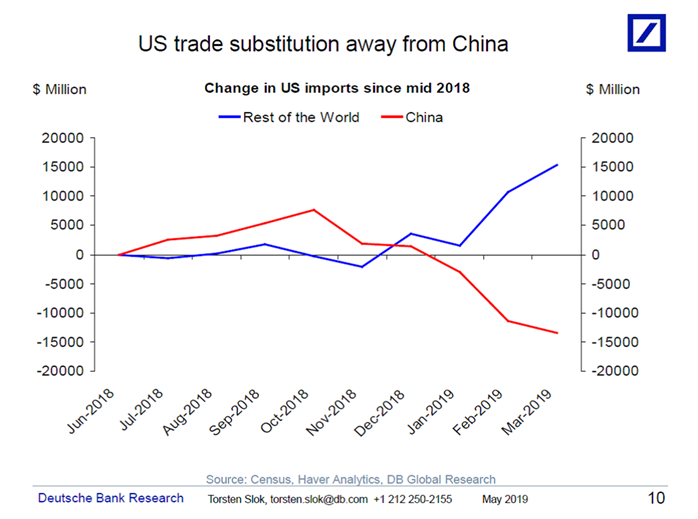Expect A Long Trade War: China Offers Tech Companies Five-Year Tax Break To Offset Tariffs
In the cleanest indication yet that China is hunkering down for what it now expected to be a very long trade war, the SCMP reports that China will give a "five-year tax break to its home-grown semiconductor makers and software developers in a bid to bolster the industries as the trade war shifts to an assault on Chinese technology."
On Wednesday afternoon, China's finance ministry said that in an attempt to bolster the local tech industry, integrated circuit makers and software companies will be exempt from paying corporate taxes for two years, starting in 2019, and in the following three years, their tax payments will be halved from the 25 percent universal rate levied on Chinese companies.
The announcement comes one day after the White House was reportedly considering cutting off the flow of vital American technology to as many as five Chinese video surveillance companies, including the biggest, Hikvision, and Zhejiang Dahua Technology. So far China's response has been largely muted, with China imposing retaliatory tariffs on US imports last week after President Donald Trump had earlier more than doubled duties on US$200 billion worth of Chinese goods.
According to the SCMP, the decision by the US "to impose tariffs on all Chinese products and put smartphone maker Huawei on a trade blacklist that could choke off vital components has severely damaged the fragile trust between the two countries, forcing China to re-examine the entire bilateral economic relationship to protect itself, according to Chinese researchers."
And while the escalation of US trade tariffs and the Huawei blacklisting have reinforced Beijing’s long-standing belief that it has to rely on itself for key technologies and resources, it appears that the opposite is happening, and as the following Deutsche Bank chart shows, it is, in fact, the US who has been shifting away its imports from China and toward the rest of the word.
(Click on image to enlarge)

Meanwhile, according to the Hong Kong media outlet, Huawei is checking with its non-US suppliers to verify whether they are still able to work with the company under the ban, and its wholly owned chip unit has said it is activating its backup plan to ensure a continuous supply. As we reported earlier this week, the telecommunications equipment maker is also developing its own operating systems for smartphones and computers after Google has suspended some Android services under the ban.
As further evidence that there will not be a quick resolution to the trade war, the view that China has to adapt to a new harsher reality has been widely shared among Chinese academics, policymakers and even the general public on the assumption that the US-China rivalry will continue and intensify, according to SCMP. President Xi Jinping called upon the nation to embark on a “new Long March” during his trip to Jiangxi province this week, sending a message that the country must prepare for hardships in a worsening external environment.
At the same time, to stoke nationalist sentiment and urge the nation to "rally around the trade war flag" China’s official media outlets are engaging in a nationalistic outpouring against the US, telling the public that the trade talks collapsed because the US was trying to bully China but that it refused to be humiliated.
Jin Canrong, an international relations professor with Renmin University of China, said in an interview with a Chinese website, Guancha.cn, that the endgame of Washington’s hawks is to “force China to give up its development” instead of seeking balanced bilateral trade.
Mei Xinyu, a fellow at the research institute under the Ministry of Commerce, said the current trade talk deadlock was similar to the Panmunjom peace talks during the Korean war in the 1950s.
“Even if a deal is reached, it could be torn apart [by Trump] easily at any time,” he said, forgetting to add that it was China that scuttled the deal in the 11th hour when Beijing decided to rewrite much of what had already been agreed upon.
Beijing should prepare for the worst-case scenario to defend its rights in climbing up the global value chain through technological catch-up, Mei added.
Finally, anyone - such as stock market algos - hoping for a quick end to trade hostilities can throw in the towel
“The trade war, as seen from the current situation, will be a long-term issue,” Zhang Yongjun, a senior economist of the China Centre for International Economic Exchanges, said last weekend. “To fight the trade war, China must boost its domestic market demand.”
And yet, despite the now undisputed signs that a trade war will last for years, traders, algos, and investors still continue to hope for an optimistic and quick resolution (for reasons discussed earlier). As a result, the eventual realization that the market is very wrong here, will be a very painful one for the bulls.
Disclosure: Copyright ©2009-2018 ZeroHedge.com/ABC Media, LTD; All Rights Reserved. Zero Hedge is intended for Mature Audiences. Familiarize yourself with our legal and use policies every ...
more


